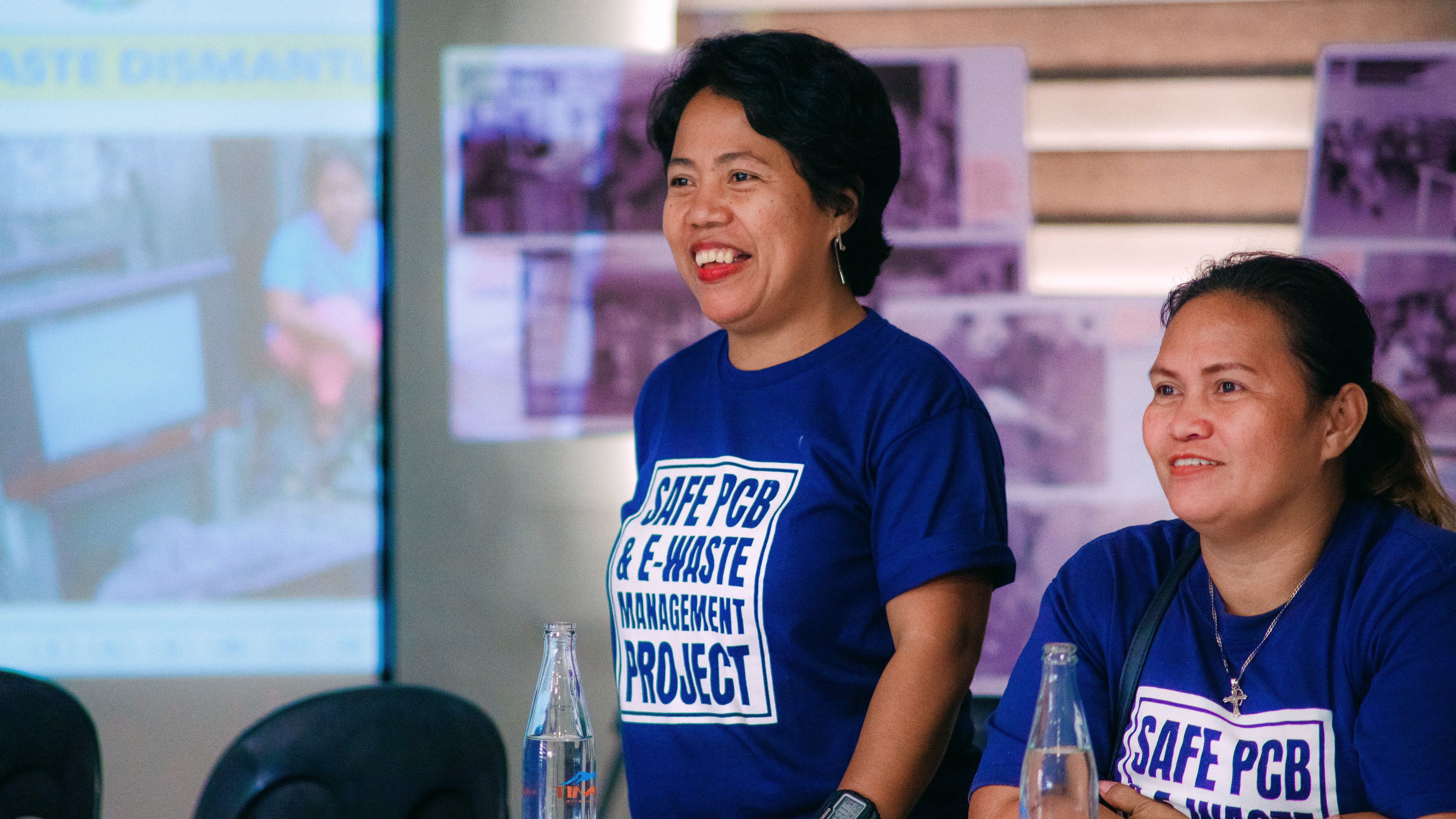Transforming E-waste into Wealth: Joanna's story
12 November 2024 UNIDO
Every morning, Joanna would wake up early to prepare breakfast for her family, before heading out to collect unwanted electronic and electrical products from customers in the village of Longos in Malabon City, Metro Manila. After a morning of hauling bulky items around the neighbourhood, often with the help of her young son, she would spend the afternoon dismantling the products she had collected earlier that day to sell the valuable parts to the local junk shop before closing at 5pm.
"I didn't realise when I went home to make dinner every night that I was bringing toxic chemicals into my home," confides Joanna.
As the fastest-growing waste stream in the world, there is much debate about how best to deal with electronic waste, known commonly as e-waste. However, as governments across the world look towards circular economy approaches, the voices of those on the front lines of the waste management crisis are often lost.
"Before the project, we dismantlers were nobody," explains Joanna. "This gave us a level."
Similarly, before, Joanna and other e-waste dismantlers were met with derision and insults from the local community when making their collection rounds. Now, local schools and hospitals are actively seeking out their expertise in the Philippines' first community-led e-waste management centre, established under a UNIDO project funded by the Global Environment Facility (GEF).
UNIDO's Myeka Trinidad worked directly on the project across the four sites it covered in the metropolitan area of Manila, where most of the country's e-waste can be found. "It is amazing to see how the project has managed to foster ownership of the centres, empowering communities to take ownership of the waste that they produce."
With the support of the Department of Environment and Natural Resources and two of the Philippines' telecom giants, Globe Telecommunications and Smart & PLDT Communications, the project has engaged diverse partners. Together, they have created a solution that puts people at the heart of a response to what is both a social and environmental threat and a bona-fide economic opportunity.
According to the latest Global E-waste Monitor, produced by UNITAR, e-waste generated worldwide in 2022 contained 31 billion kg of metals, including precious metals such as silver, gold and palladium, as well as lower-value metals, such as copper, iron/steel and aluminum. It is widely accepted that the recycling potential is high but not fully exploited. More worryingly, unsafe and harmful dismantling practices are widespread.
"E-waste has huge economic potential" explains Carmela Centeno, who managed the project on behalf of UNIDO and leads the Organization's Responsible Materials and Chemicals Management Unit. "This project sought to help people like Joanna make a decent living with safe working conditions from what could be a lucrative sector for waste management globally."
The notion of "waste as wealth” is central to circular economy models that seek to reduce, reuse, and refurbish, wherever possible. In supply chains, this concept is extended to cover remanufacturing, which naturally comes with unique challenges when applied to chemicals management.
"Before the project, we were so messy when we were dismantling," says Joanna, "so messy." The reality is that the mess created previously when dismantling with their bare hands was likely to be highly toxic to Joanna, her family, and the scores of other predominantly female dismantlers working without PPE and other safeguards. Now, thanks to the project, Joanna's working conditions have "totally changed" and crucially, hazardous chemicals found in e-waste are not being unwittingly recycled.
The lack of need for formal education may make e-waste dismantling an attractive option to many women in the Philippines and beyond, but the skills required for this physically and emotionally demanding work are undeniable. "The project took these skills and upgraded them, much in the same way the facilities themselves were upgraded," Myeka says. Previously, the facilities handled recycling for the local area but didn't cover hazardous waste, such as e-waste.
In fact, the aim is for the facilities to expand their services further to include healthcare waste in the future. In the meantime, Joanna is now president of a local e-waste association, alongside managing one of the e-waste centres, which has extended its offer to clients to include professional cleaning services for sites where e-waste has been stored.
"It is exactly this kind of innovation and collaboration that the project aimed to foster," Myeka explains, "we're almost struggling to keep up with all that's going on because they're constantly evolving." Equally inspiring is the fact that the project managed to bring together e-waste dismantlers and associations that previously competed over territories to share knowledge and learning on all things e-waste, including bargaining methods or "bola-bola" as it's known locally in Manila.

"I make bola-bola," says Joanna with a smile. There is a palpable sense of pride in this statement, especially in the knowledge that this new and improved "bola-bola" is both safe and legally compliant with local waste management regulations – another area of learning tackled in the project's training programme.
"UNIDO is committed to supporting countries to transform their economies to a circular economy model that promotes sustainable supply chains. This project, and Joanna's story, remind us that supply chains are run by people," affirms Smail Alhilali, Chief of UNIDO's Circular Economy and Green Industry Division. "In assisting countries to meet their obligations under major multilateral environmental agreements, such as the Stockholm Convention on Persistent Organic Pollutants (POPs), we can make a real difference to people's lives, while contributing to a healthier and safer planet for all."
"The project changed many aspects of our lives. All we can say is thank you," says Joanna.
For further information on this project and UNIDO's work on e-waste, please contact:
Head, Responsible Materials and Chemicals Management Unit